
In recent discussions surrounding the University of Wisconsin’s football performance, head coach Luke Fickell highlighted a critical area of concern: the team’s struggles on first downs. This issue has significantly impacted the effectiveness of the offense, creating a ripple effect that has hindered their overall performance.
First downs are crucial in establishing momentum and dictating the flow of the game. When an offense can consistently gain positive yardage on first down, it opens up the playbook for a variety of strategies on subsequent plays. However, when a team faces second or third and long situations, the options become limited, often leading to predictable play-calling and defensive advantages for opponents.
Fickell pointed out that the inability to convert on first downs has put undue pressure on the offense, forcing them to be more conservative and less creative in their approach. This not only affects the rhythm of the offense but also allows opposing defenses to key in on their weaknesses. By consistently putting themselves in challenging situations, the Badgers have struggled to maintain drives, leading to stalled possessions and missed scoring opportunities.
The statistics support Fickell’s concerns. The team has frequently found themselves in third-and-long situations, which are notoriously difficult to convert. This trend has resulted in lower overall offensive output, making it challenging to establish a strong ground game or develop the passing attack. Without the ability to gain yards on first down, the Badgers are often playing catch-up, which affects their game plan and diminishes their chances of success.
Moreover, the struggle on first downs is not solely about the offensive line or the running backs. It encompasses the entire offense, including play-calling, execution, and the quarterback’s decision-making. Fickell emphasized the need for better communication and execution at all levels, urging his players to focus on the fundamentals that lead to success on early downs.
As the season progresses, the coaching staff is prioritizing strategies to improve first-down efficiency. This includes revisiting play designs, enhancing the offensive line’s performance, and fostering better synergy among the skill positions. By addressing these issues, Fickell hopes to create a more dynamic offense that can dictate terms rather than react to the defense.
In summary, the struggles on first downs have emerged as a critical factor limiting the University of Wisconsin’s offensive capabilities. By focusing on improving this aspect of their game, the Badgers aim to enhance their overall performance, regain momentum, and become a more formidable force in their conference. Fickell’s awareness of the issue is the first step toward finding solutions and ultimately achieving the offensive consistency necessary for success.